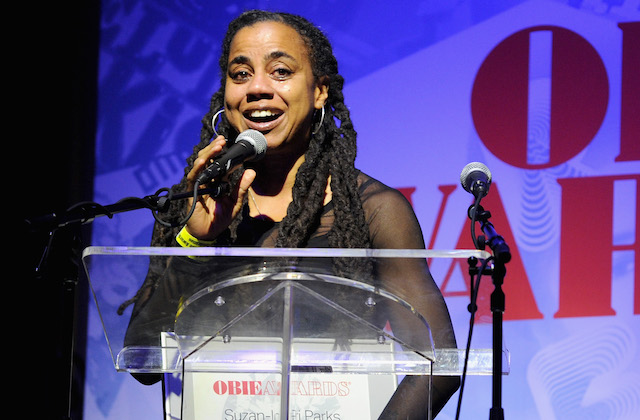The New York Times used the 25th anniversary Broadway revival of "Angels in America" as an occasion to look back at the most acclaimed plays from United States playwrights that debuted in the years since 1993.
The Times cataloged these works in "The Great Work Continues: The 25 Best American Plays Since ‘Angels in America,’" yesterday (May 31). Determined via debate and round-robin ballots from five theater critics, the interactive list features stage projects from many playwrights of color that confront issues surrounding race. Here’s a sample of the featured works and artists, along with their place on The Times’ list and excerpts from the critics’ retrospectives:
"Topdog/Underdog" by Suzan-Lori Parks (2001, #1)
rnt“Topdog/Underdog” is a tale of two impoverished African-American brothers, a scam artist and a carnival sideshow performer, who have the burdensome names of Lincoln and Booth. In depicting the daily rituals of these rivalrous but interdependent siblings—which include acting out the fateful historical encounter of another Lincoln and Booth—“Topdog/Underdog” is both a vivid, present-tense family portrait and an endlessly reverberating allegory.
"Seven Guitars" by August Wilson (1996, #8)
rntAll of his plays—which include the Pulitzer Prize winners “Fences” (1987) and “The Piano Lesson” (1990)—were written with a peerless ear for cadence and harmony that turns spoken words into song. But “Seven Guitars,” set in 1948 and first staged on Broadway in 1996, seemed to be borne from beginning to end on a swelling tide of melody.
"Twilight: Los Angeles, 1992" by Anna Deveare Smith (1994, #9)
rntIn the aftermath of the 1992 riots, Center Theater Group in Los Angeles commissioned Anna Deavere Smith to write a documentary theater piece. She interviewed 320 people whose lives were affected and created “Twilight: Los Angeles, 1992” by weaving together and performing verbatim excerpts from those interviews. The New York Times called her achievement “an expression of the eternal search for order in an anarchic world.”
"Yellow Face," by David Henry Hwang (2007, #18)
rntRace, heritage and the slipperiness of cultural identity have long been at the core of Mr. Hwang’s plays. In “Yellow Face,” he blends comic fantasy with memoir to examine the way Americans tiptoe around conversations about race, and the brutal damage that xenophobia can wreak.
"Underground Railroad Game," by Jennifer Kidwell and Scott R. Sheppard with Lightning Rod Special (2016, #21)
rntImmersive learning! Great idea, right? Not in this case. In “Underground Railroad Game,” a taboo-shattering two-hander created by Jennifer Kidwell and Scott R. Sheppard with their theater company, Lightning Rod Special, Teacher Stuart is addressing a group of fifth graders. He and Teacher Caroline have just divided the students into two groups: Union and Confederate. The Union side will get points for smuggling slaves, represented by dolls, toward freedom. The Confederate side will get points for capturing those slaves. And, hey, if the Confederates work hard enough, maybe this Civil War will have a different ending.
Watch scenes from several of the featured plays at NYTimes.com.
